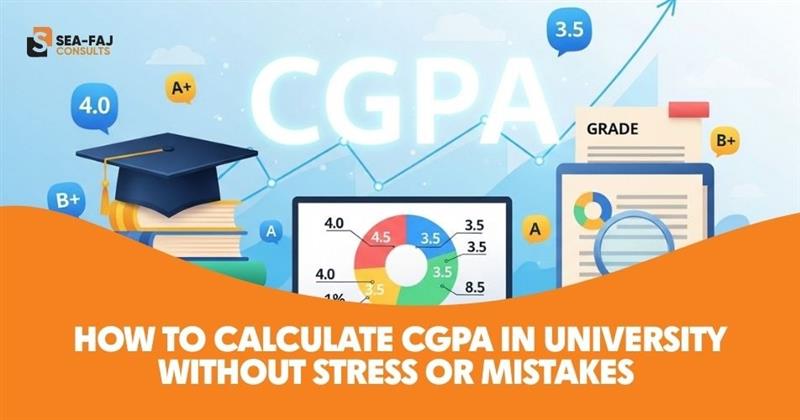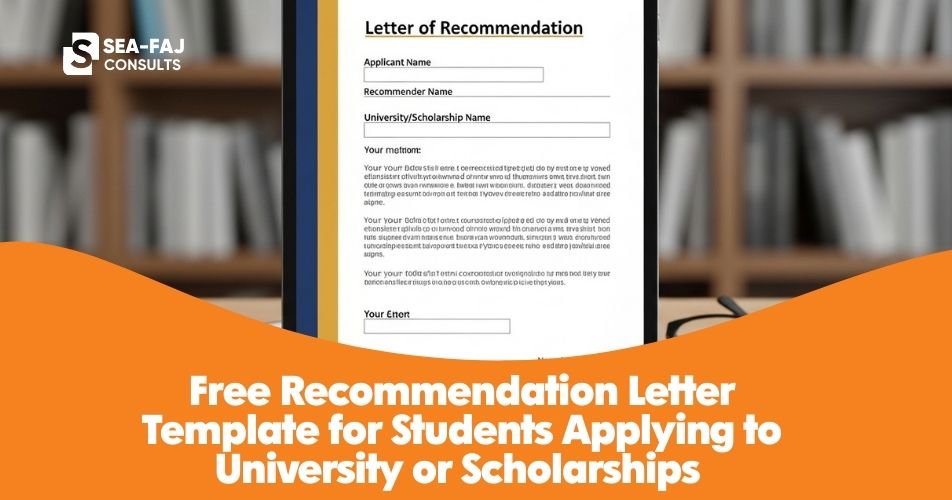Imagine getting a fully funded scholarship to attend one of the best universities in the world, getting access to outstanding education, and growing your worldwide network; all without having to worry about paying for tuition. Doesn’t it sound like a dream? Well, if you follow the right guidelines, you can definitely get a scholarship in Australia.
Scholarships in Australia offer advantages beyond only cash assistance. They give access to funds for research, employment prospects, and the opportunity to learn in a creative and multicultural setting. But obtaining a scholarship needs planning, perseverance, and strategy.
In this article, we’ll walk you through five proven ways to secure a scholarship in Australia. Whether you’re an undergraduate, postgraduate, or research student, these tips will significantly increase your chances of success.
5 Proven Ways to Secure a Scholarship in Australia
- Research Extensively on Available Scholarships
- Meet and Exceed Eligibility Requirements
- Prepare a Winning Application
- Apply Early and Stay Organized
- Ace the Scholarship Interview (If required)

1. Research Extensively on Available Scholarships
Research extensively on available scholarships, and below are types of scholarships you will find in Australia. Understanding the different scholarships available in Australia can help you choose the best ones:
Types of Scholarships in Australia
- Government-funded scholarships; examples include the Australia Awards Scholarships (AAS) and the Destination Australia Program.
- University scholarships: Institutions like the University of Queensland and Monash University offer merit-based and need-based scholarships.
- Private and NGO-funded scholarships: Organizations such as the Rotary Foundation and corporate sponsors fund scholarships for outstanding students.
Where to Find Scholarships
- University Websites: Most universities have dedicated scholarship pages; you can explore them to get the ones that match your educational background.
- Australian Government Scholarship Portals – Websites like Study in Australia provide up-to-date scholarship listings.
- Study Abroad Consultants like SEA-FAJ CONSULTS and other professionals can guide you through the application process.
2. Meet and Exceed Eligibility Requirements
Even if you find a scholarship that looks perfect for you, failing to meet the eligibility criteria can lead to automatic disqualification. That’s why it’s very important not only to meet but also to exceed the requirements.
- Academic Excellence
Most scholarships, especially merit-based ones, require a strong academic record. Universities in Australia consider factors such as GPA, standardized test scores (like IELTS or TOEFL), and class rankings. If you’re still in school, focus on maintaining high grades to boost your chances.
- Extracurricular Activities
Scholarship committees often look beyond academics. They want well-rounded individuals who contribute to their communities. Leadership roles in student organizations, volunteer work, and participation in extracurricular activities can set you apart from other applicants.
- Work Experience (If required)
Some postgraduate scholarships require applicants to have work experience related to their field of study. If you’re applying for an MBA or a research-based program, having internships or professional experience can strengthen your application.
3. Prepare a Winning Application
Your application is the key to standing out among thousands of applicants. A well-crafted personal statement, a strong essay, and solid recommendation letters can make all the difference.
How to Write a Strong Personal Statement
Your personal statement should highlight:
- Your academic achievements
- Your career goals and how the scholarship aligns with them
- Why did you choose Australia and the specific university?
- Any challenges you’ve overcome that showcase resilience?
Make sure your statement is clear, concise, and personalized for each scholarship you apply for.
How to Write a Compelling Scholarship Essay
Many scholarships require an essay. To make yours stand out, do the following:
- Stick to the prompt and answer the question directly.
- Use storytelling to make it engaging; personal experiences can make a big impact.
- Avoid generic statements; instead, showcase your unique perspective.
- Edit and proofread thoroughly to eliminate grammar and spelling errors.
How to Obtain Strong Letters of Recommendation
A recommendation letter can add credibility to your application. Choose referees who can genuinely speak about your strengths, such as professors, mentors, or employers. When requesting a letter:
- Give them ample time to write it.
- Provide details about the scholarship and what they should emphasize.
- Choose someone who knows you well and can write a detailed, personalized letter.
4. Apply Early and Stay Organized
Why Early Applications are Very Important
Scholarships are competitive, and applying early can give you an advantage. Some scholarships close applications months before the academic session begins, so start your applications as soon as possible.
Keeping Track of Deadlines and Required Documents
A well-organized application process increases your chances of success. Use tools like:
- Google Calendar to track deadlines.
- Excel sheets to list scholarships, their requirements, and submission status.
- Reminders and alerts to ensure you submit everything on time.
5. Ace the Scholarship Interview (If required)
Some scholarships require an interview as the final selection stage. Your ability to present yourself confidently and answer questions effectively can determine whether you get the scholarship.
Common Scholarship Interview Questions
Prepare for common interview questions such as:
- Why do you deserve this scholarship?
- How will this scholarship help you achieve your goals?
- What challenges have you faced, and how did you overcome them?
- How do you plan to contribute to the university or community?
How to Prepare and Practice for Scholarship Interviews
- Research the scholarship provider and understand their values.
- Practice answering questions with a friend or mentor.
- Work on confidence, clarity, and professionalism during your responses.
- Dress appropriately and maintain good body language during virtual or in-person interviews.
Why Study in Australia?
- High-Quality Education System
Australia is home to some of the best universities in the world, including the University of Melbourne, Australian National University, and the University of Sydney. These institutions are known for their cutting-edge research, high academic standards, and industry-aligned programs.
- Diverse and Inclusive Environment
As an international student, you’ll enjoy a welcoming environment with people from all over the world. Australian universities promote multiculturalism, making it easier for students to adapt and build global connections.
- Scholarship Opportunities for International Students
One of the biggest advantages of studying in Australia is the availability of scholarships. From government-funded programs to university-specific awards, there are numerous opportunities to reduce or eliminate tuition costs.
Common Mistakes to Avoid When Applying for Scholarships
Many students miss out on scholarships due to avoidable mistakes. Here are some common errors to avoid when applying for scholarships:
- Submitting incomplete applications: Missing even one document can disqualify you.
- Ignoring the eligibility criteria: applying for scholarships you’re not eligible for is a waste of time.
- Writing generic personal statements: make sure each application is customized for the specific scholarship.
- Missing deadlines: Late applications are usually not considered, so apply early.
- Not proofreading applications: Grammar and spelling mistakes can create a bad impression.
Success Story: How Sarah Won a Full Scholarship to Australia
Sarah, an aspiring environmental scientist from Nigeria, dreamed of studying at the University of Melbourne but lacked the funds. She applied for the Australia Awards Scholarship, highlighting her volunteer work in climate change awareness.
Her application stood out because she:
- Researched extensively and targeted the right scholarship.
- Maintained excellent grades throughout university.
- Wrote a compelling essay showcasing her passion for sustainability.
- Applied early and kept track of deadlines.
- Prepared thoroughly for her interview and confidently answered every question.
Sarah’s story showed that, with the correct approach, gaining a scholarship is possible.
Inconclusion, getting a scholarship in Australia requires commitment, research, and powerful application strategies. You can significantly increase your chances of success by looking into available scholarships, meeting eligibility requirements, writing a compelling application, applying early, and performing exceptionally well in interviews.
Beyond lifting financial burdens, scholarships in Australia offer access to top-notch education, professional development, and opportunities for networking.
Are you having trouble getting the ideal scholarship? For professional advice and one-on-one counselling on how to secure funding for your education in Australia, get in touch with us to move a step closer to your study abroad dream!
FAQs
1. What is the easiest scholarship to get in Australia?
Government and university merit-based scholarships are relatively easier to secure if you have a strong academic record.
2. Can I get a full scholarship to study in Australia?
Yes! Programs like Australia Awards and Destination Australia offer fully funded scholarships covering tuition, living expenses, and travel.
3. What are the English proficiency requirements for Australian scholarships?
Most scholarships require IELTS (6.5+), TOEFL, or PTE scores, depending on the university’s requirements.
4. How competitive are Australian scholarships for international students?
Competition is high, but a strong academic profile, leadership experience, and a well-prepared application can improve your chances.
5. Do I need work experience to apply for a scholarship in Australia?
It depends. Some postgraduate scholarships require work experience, while undergraduate scholarships focus on academic performance.
Read Also:
10 Steps to Secure Admission at Top Global Universities
How to Choose the Best Country for Your Study Abroad Journey




